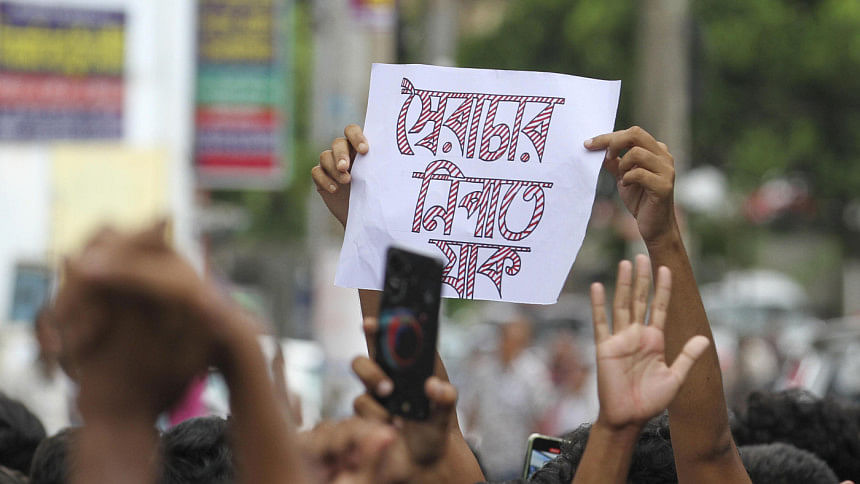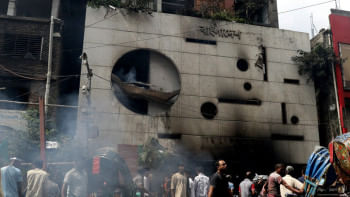How to describe the Awami League accurately?

In an article titled "How Not to Describe the Awami League" published in this newspaper, British journalist David Bergman rightly underscores the importance of accuracy in labelling a political party—particularly when such labels carry potential legal consequences. Those familiar with Bergman's work over the years know that he has consistently taken on politically sensitive and controversial subjects, often at significant personal and professional costs. His courage and commitment to journalistic integrity deserve recognition.
Bergman is correct in asserting that "while serious criticisms of the Awami League are both valid and necessary, they must be proportionate and grounded in fact." His analysis focuses primarily on the legal validity and appropriateness of labelling the Awami League as "fascist" or "Nazi." He argues that comparing the party to the Nazi regime trivialises the scale of Nazi atrocities and misrepresents the complexities of Bangladeshi politics.
Indeed, any historical comparison between the Nazi Party and the Awami League would be an exaggeration. The scale of violence, genocidal policies, and totalitarianism under the Nazis is unmatched. However, describing the Awami League as a "fascist" party—based on its trajectory and actions within the context of Bangladesh's political history—is not a distortion. On the contrary, it is a term that demands serious consideration.
Let's examine what defines fascism. According to Merriam-Webster, fascism is:
"A populist political philosophy, movement, or regime (such as that of the Fascisti) that exalts nation and often race above the individual, that is associated with a centralised autocratic government headed by a dictatorial leader, and that is characterised by severe economic and social regimentation and by forcible suppression of opposition."
The Cambridge Dictionary defines it as:
"A political system based on a very powerful leader, state control, and being extremely proud of (the) country and race, and in which political opposition is not allowed."
With the exception of racial supremacy, the Awami League—especially under Sheikh Hasina's leadership—demonstrates most of these traits. It is important to acknowledge that the Awami League of today is not the same party founded by Maulana Abdul Hamid Khan Bhashani and Sheikh Mujibur Rahman. The party that once led the struggle for independence has undergone several transformations—dissolving into BAKSAL in 1975 and re-emerging under military rule. Since Sheikh Hasina assumed leadership in 1981, the party has been fundamentally reshaped—ideologically and structurally—into a vehicle for autocratic rule.
Recognising that fascism today is understood more broadly, the US-based think tank Council on Foreign Relations (CFR) identifies extreme nationalism, cult of personality, and mass mobilisation as hallmarks of fascist systems. Has the Awami League not exhibited these traits?
Bergman, like several commentators, seems to conflate a ban on the activities of the Awami League with a ban on the party itself. The official notification only restricts its activities including use of violence, which the interim government considers can influence the judicial process adversely—not the party's existence. It is akin to placing conditions on a defendant during trial to prevent interference. This distinction matters and must be preserved to avoid further confusion.
Consider how dissenters have been labelled anti-national, often branded as "Razakars" or agents of Pakistan. The idolisation of Sheikh Mujibur Rahman—evident in the proliferation of his images, statues, and memorials—has fostered a cult of personality around the Sheikh family. The Awami League's grip on the state apparatus has allowed it to mobilise supporters and suppress opposition with unmatched efficiency.
The CFR also warns that, while classical fascism is historically tied to the interwar period, its characteristics can reappear in modern political contexts. Global democratic backsliding only increases the risk of such authoritarian tendencies resurfacing.
Bergman's cautious assertion that "elements of the Awami League's conduct may well resemble certain authoritarian traits of a fascist party" but that it is "inaccurate to describe it as one" is problematic. This framing can inadvertently downplay the extent of Sheikh Hasina's authoritarian control. Party officials, including the general secretary, frequently have openly acknowledged that final decisions rest solely with the party chief. Even her son, Sajeeb Wazed Joy, once admitted that Sheikh Hasina appreciates being portrayed by Western media as an authoritarian leader.
Using the four key indicators of authoritarian behaviour identified by Steven Levitsky and Daniel Ziblatt in How Democracies Die, one could argue that democracy in Bangladesh has long ceased to function. These indicators are: rejecting democratic rules of the game; denying legitimacy to political opponents; encouraging violence; and curtailing civil liberties. All four apply to Bangladesh's current political landscape.
That said, Bergman's concerns about repression, including arbitrary arrests and politically motivated charges, are entirely valid. Justice demands that those responsible for violence—particularly against opposition members and student protesters—be held accountable. However, no one should be persecuted on fabricated or politically expedient charges.
Bergman, like several commentators, seems to conflate a ban on the activities of the Awami League with a ban on the party itself. The official notification only restricts its activities including use of violence, which the interim government considers can influence the judicial process adversely—not the party's existence. It is akin to placing conditions on a defendant during trial to prevent interference. This distinction matters and must be preserved to avoid further confusion.
In sum, describing the Awami League in precise and historically informed terms is essential for ensuring that political discourse in Bangladesh remains honest and grounded in reality.
Kamal Ahmed is head of the Media Reform Commission in Bangladesh and an independent journalist. His X handle is @ahmedka1.
Views expressed in this article are the author's own.
Follow The Daily Star Opinion on Facebook for the latest opinions, commentaries and analyses by experts and professionals. To contribute your article or letter to The Daily Star Opinion, see our guidelines for submission.

 For all latest news, follow The Daily Star's Google News channel.
For all latest news, follow The Daily Star's Google News channel. 










Comments